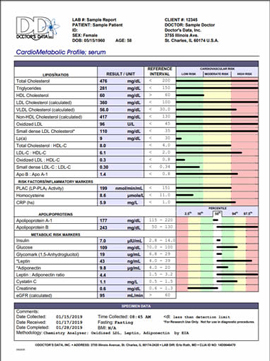Unfortunately, heart disease remains the second-most leading cause of death in North America. While cholesterol testing remains the standard measure of risk for heart disease, more than 50% of people with “desirable” cholesterol are still at risk for heart disease. Our comprehensive testing looks for much wider and more specific indicators for risk of heart disease. Identifying significant risk factors can help us determine much stronger and more direct forms of treatment to combat this potentially fatal risk. For more information, Vitalia Healthcare of Vancouver, BC provides a Sample Profile Comprehensive Cardio Assessment.
The Comprehensive Cardiovascular Assessment is used to evaluate both traditional risk factors and advanced laboratory testing that accurately measures clotting factors, vascular inflammation, endothelial dysfunction, lipid deposits, and other mechanisms that that are underlying factors of cardiovascular disease. There are a number of early warning biomarkers for cardiovascular disease (CVD). Advanced clinical tools can be used to identity patients with a predisposition to cardiovascular disease which can be very beneficial in terms of preventative intervention.
Markers for Cardiovascular Disease
Total Cholesterol: Total cholesterol can serve both as a marker for cardiovascular health and oxidative stress. While high cholesterol levels have been directly linked to increased atherosclerosis, it also has an important function of protecting cell membranes from free radicals. In addition to total cholesterol assessment, it’s important to evaluate other lipid markers for a more accurate assessment of heart disease.
Triglycerides: Triglycerides are the primary fatty acids generally found in animal fats and vegetable oils. Patients with diets high in carbohydrates can significantly increase triglyceride levels, especially if carbohydrates account for 60% of the patient’s total calorie intake. High levels of triglycerides in the body over an extended period of time have been linked with heart disease, atherosclerosis and stroke.
Homocysteine: Homocysteine is a type of non-protein amino acid found in the blood that is generally acquired from consuming meat products. High levels of homocysteine in the body are related to the early development of blood vessel and heart disease. It is also associated with lower levels of vitamins B6 and B12. Patients with a history of depression, diabetes, multiple sclerosis, Alzheimer’s disease, osteoporosis, birth defects, and rheumatoid arthritis may have elevated levels of homocysteine.
Low Density Lipoproteins (LDL): Low density proteins, also referred to as “bad cholesterol” is often caused by diets high in cholesterol and saturated fats, causing high levels of circulating LDL. Research shows that maintaining high levels of LDL can be a primary cause of heart disease. Vitalia Healthcare in Vancouver incorporates the measurement of LDL which is critical for a complete cardiovascular assessment.
High-Density Lipoproteins (HDL): High-density proteins, also referred to as “good cholesterol”, are developed in the blood with various other components derived from the cell membranes, intestine, liver, and triglyceride lipoproteins. Research shows that maintaining high levels of HDL can reduce your risk of heart disease.
Lipoprotein(a): Lipoprotein(a) is a group of lipoproteins that consists of LDL cholesterol that is bound to protein apolipoprotein(a). As lipoprotein(a) levels rise, the patient’s risk of heart attack also rises. High levels of lipoprotein(a) have been directly linked with heart disease, atherosclerosis, cerebrovascular disease, stroke, and thrombosis.
C-Reactive Protein: C-Reactive protein is a vital biomarker that is linked to inflammation. Patients who have high levels of C-Reactive protein in the body encourage an increased risk of coagulation and damage to the vascular endothelium. Vitalia Healthcare in Vancouver can help assess these biomarkers before they become a major threat to cardiovascular health.
Vitalia Healthcare in Vancouver has the tools and knowledge necessary to perform an accurate Comprehensive Cardiovascular Assessment to help look for indicators for risk of heart disease therefore helping you lower your risk. Call Vitalia Healthcare at 1-604-566-WELL (9355) today to learn more about our treatment options.


